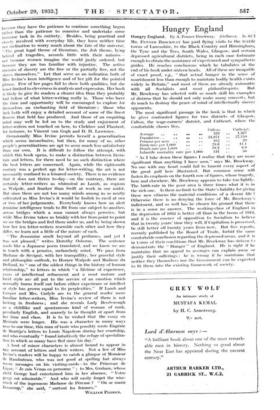Hungry England
Hungry England. By A. Fenner Bniekway. (Gollanez. 2s. ad.) MR. PENNER BROCKWAY has paid flying visits to the textile towns of Lancashire, to the Black Country and Birmingham, the Tyne and the Tees, South Wales, Glasgow, and certain depressed agricultural districts, being in each case fortunate enough to obtain the assistance of experienced and sympathetic. guides. He reaches conclusions which he tabulatei at the end of his book under sixteen heads. All of these are incapable. of exact proof, e.g., " that actual hunger in the sense of nourishment less than enough to maintain bodily health exists, widely in Britain," and most of them are already axiomatic. with all Socialists and most philanthropists. But Mr. Brockway has selected with so much skill his examples of distreSs that he should not-only Make many converts, but do much to destroy the peace of mind of intellectually sincere opponents. The most significant passage in the book is that in which. he gives Contrasted figures for two districts of Glasgow,. Calton, the wage-earners' district, and Cathcart, where the comfortable classes live.
Calton. Cathcart.
Acreage 333 1,327
Population .. • •
33,971 .. 27,150 Persons per acre. 102 20 Birth-rate per 1,000 28.6 11.1 Death-rate per 1,000
19.3
9.9
Infantile mortality rate per 1,000 131 ..
•
"As I take down these figures I realize that they are more significant than anything I have seen," says Mr. Brockway.' No one with any heart could fail to lament every aspect of the great gulf here illustrated. But common sense will fasten its emphasis on the fourth row of figures, whose tragedy, here and elsewhere, Mr. Brockway appears to take too lightly. The birth-rate in the poor area is three times what it is in the rich one. Is there no limit to the State's liability for giving these new citizens the material conditions of a decent life ? Otherwise there is no denying the force of Mr. Brockway's iiidictment, and so well has he chosen his ground that there' is in a sense no answer. The working-class of England in the depression of 1932 is better off than in the boom of 1913, and it is the essence of opposition to Socialism to believe that in twenty years' time they will, if Capitalism is preserved, be still better off twenty years from now. But five reports, recently published by the Board of Trade, forbid the same comfortable conclusion regarding the depressed areas, and it is in tnins of their conditions that Mr. Brockway has striven t3 demonstrate the " Hunger " of England. lie is right if he maintains that no appeal to averages can explain away or justify their sufferings ; he is wrong if he maintains that neither they themselves nor the Government can be expected to fit them into the existing framework of society.












































 Previous page
Previous page